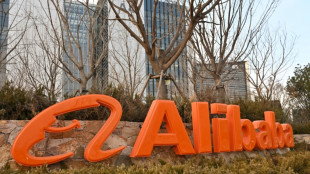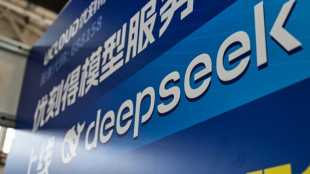
-
 China's Alibaba to invest $50 bn in AI, cloud computing
China's Alibaba to invest $50 bn in AI, cloud computing
-
Indonesia launches new multi-billion-dollar sovereign wealth fund

-
 Most Asian markets track Wall St loss; Hong Kong extends gains
Most Asian markets track Wall St loss; Hong Kong extends gains
-
Japan warns of avalanches, icy roads ahead of more snow

-
 Conservatives win German vote as far-right makes record gains
Conservatives win German vote as far-right makes record gains
-
'Captain America' slips but clings to N. America box office lead

-
 Tens of thousands vow support for Lebanon's Hezbollah at slain leader's funeral
Tens of thousands vow support for Lebanon's Hezbollah at slain leader's funeral
-
Tens of thousands pour in for Beirut funeral of slain Hezbollah leader

-
 Germans vote under shadow of far-right surge, Trump
Germans vote under shadow of far-right surge, Trump
-
Hong Kong and Singapore lead Asia's drive to cash in on crypto boom

-
 Well-off Hong Kong daunted by record deficits
Well-off Hong Kong daunted by record deficits
-
Trump tariffs shake up China's factory heartland

-
 Top issues in Germany's election campaign
Top issues in Germany's election campaign
-
Friedrich Merz: conservative on verge of German chancellery

-
 Germans go to vote under shadow of far-right surge, Trump
Germans go to vote under shadow of far-right surge, Trump
-
Oscars favorite Baker says indie film 'struggling' as 'Anora' tops Spirit Awards

-
 'Worst is over' as Chile's 'stolen' babies reunite with mothers
'Worst is over' as Chile's 'stolen' babies reunite with mothers
-
France's agriculture show, an outlet for angry farmers

-
 China's EV maker XPeng eyes doubling global presence by year's end
China's EV maker XPeng eyes doubling global presence by year's end
-
Germany on eve of elections under shadow of US-European rift

-
 France still seeking to block EU-Mercosur trade deal: Macron
France still seeking to block EU-Mercosur trade deal: Macron
-
Ukraine's earth riches are rare and difficult to reach

-
 On $15 a month, Venezuela's teachers live hand to mouth
On $15 a month, Venezuela's teachers live hand to mouth
-
'See you in court': Trump, governor spar over trans rights

-
 US stocks tumble on fears of slowdown
US stocks tumble on fears of slowdown
-
Cuba opens solar park hoping to stave off blackouts

-
 German flying taxi start-up's rescue deal collapses
German flying taxi start-up's rescue deal collapses
-
Stock markets diverge, oil prices slide

-
 'Queen of Pop' Madonna lambasts 'King' Trump
'Queen of Pop' Madonna lambasts 'King' Trump
-
Apple says halting data protection tool for UK users

-
 Female chefs condemn sexism in British kitchens
Female chefs condemn sexism in British kitchens
-
US, China economic leaders raise 'serious concerns' in first call

-
 Russia sells famed imperial prison at auction
Russia sells famed imperial prison at auction
-
Stock markets rise as Alibaba fuels Hong Kong tech rally

-
 France full-back Jaminet returns to rugby after racist video ban
France full-back Jaminet returns to rugby after racist video ban
-
Chinese AI companies celebrate DeepSeek, shrug off global curbs

-
 Asian markets advance as Alibaba fuels Hong Kong tech rally
Asian markets advance as Alibaba fuels Hong Kong tech rally
-
Nissan shares jump 11% on reported plan to seek Tesla investment

-
 Trump aid cut imperils water scheme in scorching Pakistan city
Trump aid cut imperils water scheme in scorching Pakistan city
-
Just 17% of Japan citizens hold passport, data shows

-
 Most Asian markets rise as traders pick over week of headlines
Most Asian markets rise as traders pick over week of headlines
-
Japan's core inflation rate hits 19-month high

-
 How a 'forgotten' Minnesota monastery inspired 'The Brutalist'
How a 'forgotten' Minnesota monastery inspired 'The Brutalist'
-
Japan's core inflation rate hits 3.2% in January

-
 Stocks mostly fall on tepid Walmart outlook, geopolitical worries
Stocks mostly fall on tepid Walmart outlook, geopolitical worries
-
Musk in X spat with Danish astronaut over 'abandoned' ISS crew

-
 Bond franchise shake-up moves spy into Amazon stable
Bond franchise shake-up moves spy into Amazon stable
-
New York seeks hundreds of millions of dollars in 'vaping epidemic' case

-
 Moon or Mars? NASA's future at a crossroads under Trump
Moon or Mars? NASA's future at a crossroads under Trump
-
Spotify adds more AI-generated audiobooks


Toyota overcomes chip shortage to beat Q3 net profit forecast
Toyota on Wednesday posted a forecast-beating net profit of $6.8 billion for the three months to December, even as a global chip crunch and a pandemic-driven parts shortage forced production cuts.
The Japanese auto giant, which kept its crown as the world's top-selling carmaker in 2021, left its annual net profit outlook unchanged but slightly lowered its full-year vehicle sales and production targets.
It posted a 791.7 billion yen net profit for October-December, down 5.6 percent on-year but far better than the 619.2 billion predicted by Bloomberg analysts.
For the nine months to December, the firm logged net profit of 2.31 trillion yen -- a jump of 57.8 percent from the previous year, when virus lockdowns battered the auto industry. Quarterly sales rose by a fifth on-year.
"Despite negative factors such as constraints on supply due to the shortage of semiconductors and the spread of Covid-19, as well as the sharp rise in raw material costs, we achieved higher sales and profits" in the first nine months of 2021-22, Toyota said in a statement.
A weaker yen, "supply chain efforts", marketing initiatives and the appeal of its new products contributed to the profit increase, it added.
When Covid-19 first triggered a global drought of semiconductors -- an essential component of modern cars -- Toyota appeared better placed than its rivals to weather the crunch, having strengthened ties with its domestic suppliers after Japan's 2011 earthquake and tsunami.
But with the crisis showing no signs of ending, the automaker has found itself unable to escape the effects.
Toyota cited "operation instability" on a decision to slightly lower its production projection for the year to 8.5 million units from nine million, having already reduced it from 9.3 million in November.
- 'Adept' procurement -
"Despite reducing the production volume forecast, we have left the operating income forecast unchanged, taking into account the depreciation of the yen and the accumulation of profit improvement activities," Toyota said.
"Currently, customers have to wait for a very long time to receive our products... We have formulated as robust production plan as possible for this fiscal year and next," it added, acknowledging that current challenges made it "very difficult" to predict future performance.
Satoru Takada, an auto analyst at research and consulting firm TIW, told AFP that Toyota has done well so far in a difficult year.
"Sales have been strong" and the company "has been able to offer attractive vehicles", he explained. "Its procurement ability, including from parts makers, remains very adept."
But the fourth quarter could prove more difficult, he warned, as production cuts and "uncertain factors" may take their toll on Toyota's bottom line.
Toyota hung on to its title as the world's top-selling automaker last year when it sold nearly 10.5 million vehicles -- a jump of about 10 percent from 2020, including units made by its Daihatsu and Hino subsidiaries.
The firm increased its lead over German rival Volkswagen, which shifted 8.9 million vehicles in 2021, down 4.5 percent on-year owing to the chip drought.
Toyota also recently hiked its 2030 electric vehicle sales goal by 75 percent in a more ambitious plan for the sector as part of efforts to drive down carbon emissions.
P.Kolisnyk--CPN
